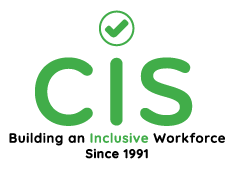As we celebrate the month of NDEAM (National Disability Employment Awareness Month), we want to stop and shed light on a pressing issue many of us may face. Did you know that October 15th- 21st is Invisible Disability Awareness Week? IDAW shines a light on disabilities that are not immediately apparent and is meant to spread awareness, education, and support for people everywhere living with invisible disabilities.
To help us spread awareness of this important issue, we turned to our team at CIS and invited any staff who wished to share their story of living with an invisible disability. The response was tremendous, and the responses we received were both insightful and moving.
We begin today by sharing Shannon’s story. Shannon (they/them/theirs) is a PhillyWINs Coordinator at CIS, and their response underscored the importance of raising public consciousness of invisible disabilities:
“I have epilepsy, GAD, clinical depression, plaque psoriasis, and psoriatic arthritis. Each of these began presenting symptoms around the start of puberty, but none were formally diagnosed until I was an adult. A lack of awareness and education about invisible disabilities were the main reasons I was not diagnosed for many years. Many years without diagnoses = many years toughing it out with no medical intervention.
Having invisible disabilities has made existing in public spaces incredibly difficult over the years. It is remarkably easy for even the most well-meaning able-bodied/neurotypical person to forget to prioritize accessibility. In 2015, 1.2% of the total US population had active epilepsy (CDC). Despite how common epilepsy is, every major holiday in the US features flashing or strobing light decorations. Despite how common arthritis is in people both young and old, there is a serious lack of seating and well-serviced elevators in public spaces.
It requires active advocacy by people with disabilities AND people without disabilities to enact long-lasting changes. Let us remember to lift the voices of marginalized populations and to believe them when they tell you, their stories.”
